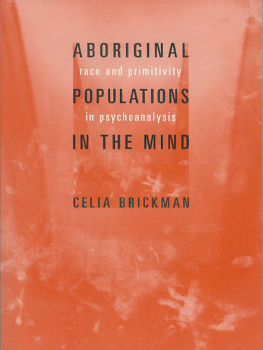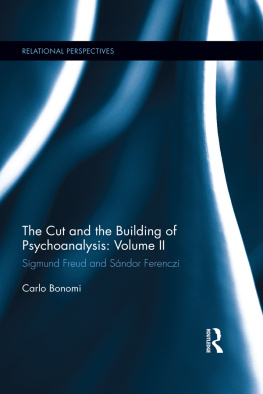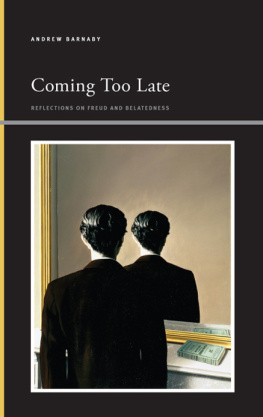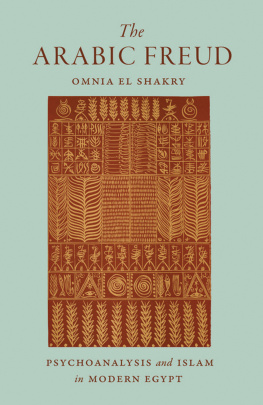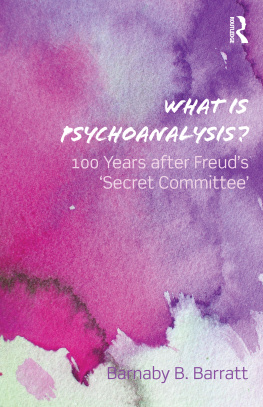ABORIGINAL POPULATIONS IN THE MIND
Columbia University Press
Publishers Since 1893
New York
Chichester, West Sussex
cup.columbia.edu
Copyright 2003 Celia Brickman
All rights reserved
E-ISBN 978-0-231-50089-0
Library of Congress Cataloging-in-Publication Data
Brickman, Celia.
Aboriginal populations in the mind : race and primitivity in psychoanalysis / Celia Brickman.
p. cm.
Includes bibliographical references and index.
ISBN 0231125828 (cloth : alk. paper)
ISBN 0231125836 (paper : alk. paper)
1. Psychoanalysis. 2. Freud, Sigmund, 18561939 I. Title.
BF173.B79 2003
150.195dc21
2002041423
A Columbia University Press E-book.
CUP would be pleased to hear about your reading experience with this e-book at .

While writing this book, I have often looked forward to the pleasure of being able to thank all the people whose learning, conversation, and support have contributed in a myriad of ways to its completion. I am grateful for the intellectual support of Peter Homans, Wendy Doniger, and Lisa Ruddick, who read and commented on the manuscript in its initial stages. Susan Gooding and Maureen McLane have been invaluable friends and interlocutors, and their insights into the issues raised here and close readings of each chapter have helped shape this book in more ways than I can say. Vivifying and sustaining conversations with them and with Anne Blackburn, Elise LaRose, and Phillis Sheppard helped clarify my ideas and introduce me to new perspectives and kept me aloft when my confidence faltered. They, along with Vicki Olwell, Linda Shapiro, Jeffrey Librett, Dawn Marlan, and Laura Slatkin, have each read all or parts of the manuscript, offering important criticism and encouragement. I would like to thank my editor Peter Dimock and his assistant Anne Routon at Columbia University Press for their warm welcome of this project and their guidance through the process of publication; and I thank Rita Bernhard for her skillful editing.
I would also like to thank the Person, Culture, and Religion section of the American Academy of Religion; the Association for the Psychoanalysis of Culture and Society; and Nahum Chandler of the Program for Comparative American Cultures at The Johns Hopkins University for giving me opportunities to share some of this work in public and to engage in invigorating dialogue about it. The profusion of footnotes is a testament to the fact that this work was made possible through (textual) conversations from which I have benefited immeasurably; from among many, I would like to mention in particular George W. Stocking Jr., Judith Butler, and Jessica Benjamin, each of whose work, in very different ways, gave me the tools to think through the problems I have attempted to unravel here.
Finally, I would like to thank my colleagues at the Center for Religion and Psychotherapy of Chicago for providing a clinical home that has been an enriching counterbalance to my academic work and for their generous flexibility in response to my needs for extra time in which to write; Karen and Harold Boaz for furnishing a beautiful setting in which to work during parts of several summers; and my mother for her enduring support. Research grants from the Centers Randall Mason Research Fund, along with the University of Chicagos Colver Rosenberger Dissertation Prize, helped fund the writing of parts of this book.
Know what [the anthropologist] thinks a savage is and you have the key to his work. You know what he thinks he himself is.
Clifford Geertz, The Interpretation of Cultures
Our ways of making the Other are ways of making ourselves.
Johannes Fabian, Presence and Representation
... savages... a well-preserved picture of an early stage of our own development.
Freud, Totem and Taboo
How does psychoanalysis configure racial difference, and what do we learn when we consider this question from a postcolonial perspective? This issue began to press itself upon me as I pursued interdisciplinary academic work in the humanities and the social sciences while I was engaged in psychoanalytically based psychotherapeutic work. It first made itself apparent to me as I repeatedly encountered, within these two different frameworks, markedly differing uses and evaluations of the category of primitivity. In the academy I was confronted with the trenchant critiques of postcolonial theorists who considered the idea of the primitive to be a long-abandoned relic of anthropologys colonial ancestry, where its invocation of the presumed inferiority of non-white and non-western peoples as well as of the romance of lost origins had served to contribute to the legitimation of Europes colonial and slaving enterprises around the globe. In my clinical training and work I was guided toward the care of psychological suffering within a discursive framework that made liberal use of the term primitivity to describe the behaviors that characterized the painful situations in which our patients found themselves. In the clinic I was struck by the common and casual use of this term: S/hes so primitive, I often heard, or that behavior is so primitive. Indeed, patients themselves sometimes took up the same language to complain about the intractable nature of their habits, as did one I once worked with: its just so primitive.
An overview of recent psychoanalytic literature reveals that this usage is ubiquitous, and thus receives the full legitimating support a prestigious field can confer. For a while, I accepted it at face value: after all, psychoanalytic theory tells us that our patterns of behavior and the roots of our pathologies lie in the earliest experiences of our lives, when our mental organization and abilities are at their most rudimentary. Why not call this level of organization primitive? Why not describe certain behaviors understood to be immature and childish as primitive? Surely the term primitive is commonly used in everyday life, as well as within psychoanalytic theory, to convey the raw and the rudimentary, the undeveloped, the archaic.
Nonetheless, this psychoanalytic usage bothered me, and I wondered just what it implied. Was primitive behavior meant to refer exclusively to characteristics of infants and regressive episodes in adults, or did its meaning also somehow apply to those who used to beand apparently sometimes still arereferred to as primitive peoples? Why was psychopathology characterized as primitive, along with femininity and religious experience, and just what did this confluence of primitive referents signify? If the psychoanalytic meaning of primitivity extended to so-called primitive peoples as well, as it often seemed, was contemporary clinical psychoanalysis proffering a covert social Darwinism in its developmental coding of behavior? How could the clinical usage of the term primitive not be connected with the racist category which, for centuries, had classified the non-white, non-western world as eligible for colonization and domination by the west?
It began to dawn on me that what I was witnessing in these casual and not-so-casual remarks were unacknowledged traces of the racially inflected evolutionary theory that had provided Freud with the foundational premises of his social thought. I began to realize that the problem extended far beyond the use of a single term, although I became convinced that within psychoanalysis the term

